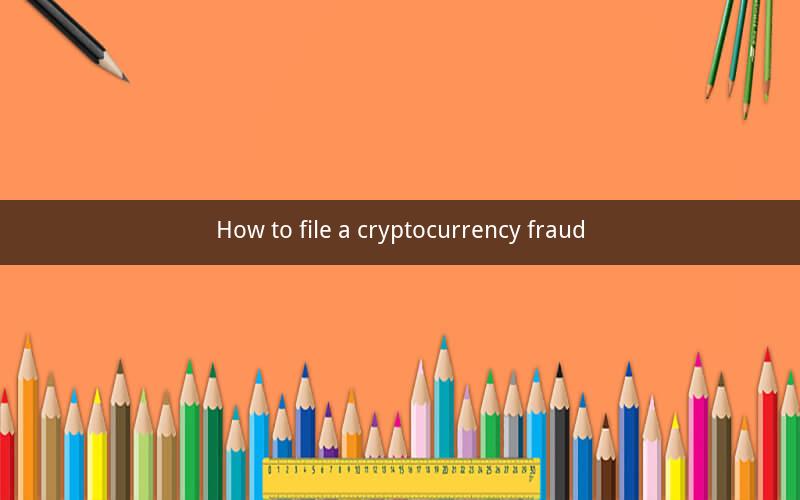
How to File a Cryptocurrency Fraud
Table of Contents
1. Introduction to Cryptocurrency Fraud
2. Identifying Cryptocurrency Fraud
3. Gathering Evidence
4. Reporting to the Authorities
5. Legal Considerations
6. The Role of Cybersecurity Experts
7. Preventing Future Cryptocurrency Fraud
8. Conclusion
1. Introduction to Cryptocurrency Fraud
Cryptocurrency fraud has become a significant concern in recent years, as the popularity of digital currencies continues to rise. With the anonymity and decentralized nature of cryptocurrencies, fraudsters have found new avenues to exploit unsuspecting individuals and businesses. Understanding how to file a cryptocurrency fraud report is crucial for protecting yourself and others from falling victim to such scams.
2. Identifying Cryptocurrency Fraud
Before filing a cryptocurrency fraud report, it is essential to identify the type of fraud you have encountered. Common types of cryptocurrency fraud include:
- Phishing scams: Fraudsters send fake emails or messages that appear to be from legitimate cryptocurrency exchanges or wallets.
- Ponzi schemes: These fraudulent schemes promise high returns on investments, but ultimately, the investors lose their money.
- Fake exchanges: Scammers create fake cryptocurrency exchanges to steal users' funds.
- Ransomware: Cybercriminals encrypt users' cryptocurrency wallets and demand a ransom for the decryption key.
3. Gathering Evidence
To file a cryptocurrency fraud report, you need to gather evidence to support your claim. Here are some steps to follow:
- Document all communication: Save emails, messages, and any other forms of communication with the fraudulent entity.
- Keep records of transactions: Provide copies of your cryptocurrency wallet transactions and any other relevant financial records.
- Take screenshots: Capture screenshots of any suspicious websites, emails, or messages.
- Contact your cryptocurrency wallet provider: Inform them about the fraudulent activity and request their assistance in resolving the issue.
4. Reporting to the Authorities
Once you have gathered the necessary evidence, it is time to report the cryptocurrency fraud. Here are some authorities you can contact:
- Local law enforcement: File a report with your local police department or cybercrime unit.
- Financial institution: If the fraud involved a bank or credit card, report it to your financial institution.
- Cryptocurrency exchange: Contact the exchange where the fraudulent activity occurred and provide them with the evidence you have gathered.
- Cybersecurity organizations: Reach out to organizations like the Internet Crime Complaint Center (IC3) or the Cybersecurity and Infrastructure Security Agency (CISA).
5. Legal Considerations
When filing a cryptocurrency fraud report, it is crucial to understand the legal implications. Consult with a lawyer to ensure that you are taking the appropriate steps to protect your rights and interests. Some legal considerations include:
- Preserving evidence: Keep all evidence secure and ensure that it is admissible in court if necessary.
- Reporting deadlines: Be aware of any time limits for reporting the fraud.
- Potential restitution: Understand the process for seeking restitution or compensation for your losses.
6. The Role of Cybersecurity Experts
In some cases, cybersecurity experts may be needed to investigate the cryptocurrency fraud. These experts can help:
- Analyze the fraudulent activity: Determine the nature of the fraud and identify the responsible parties.
- Provide technical assistance: Help you secure your cryptocurrency wallets and prevent future attacks.
- Collaborate with law enforcement: Assist law enforcement agencies in their investigation.
7. Preventing Future Cryptocurrency Fraud
To protect yourself from future cryptocurrency fraud, consider the following preventive measures:
- Educate yourself: Stay informed about the latest cryptocurrency scams and fraud techniques.
- Use secure wallets: Choose reputable cryptocurrency wallets with strong security features.
- Be cautious of unsolicited communications: Avoid clicking on suspicious links or providing personal information.
- Keep software updated: Regularly update your computer and mobile devices to protect against vulnerabilities.
8. Conclusion
Filing a cryptocurrency fraud report is an essential step in protecting yourself and others from falling victim to scams. By understanding the types of cryptocurrency fraud, gathering evidence, reporting to the authorities, and taking preventive measures, you can help combat this growing threat.
Questions and Answers
1. What is cryptocurrency fraud?
Answer: Cryptocurrency fraud refers to fraudulent activities involving digital currencies, such as phishing scams, Ponzi schemes, and fake exchanges.
2. How can I identify cryptocurrency fraud?
Answer: Look for signs such as unsolicited communications, high returns on investments, and fake websites or exchanges.
3. What evidence should I gather for a cryptocurrency fraud report?
Answer: Document all communication, keep records of transactions, take screenshots, and contact your cryptocurrency wallet provider.
4. Who should I report cryptocurrency fraud to?
Answer: Contact local law enforcement, financial institutions, cryptocurrency exchanges, and cybersecurity organizations like the IC3 or CISA.
5. What legal considerations should I be aware of when filing a cryptocurrency fraud report?
Answer: Preserve evidence, be aware of reporting deadlines, and understand the process for seeking restitution or compensation.
6. Can cybersecurity experts help with cryptocurrency fraud investigations?
Answer: Yes, cybersecurity experts can analyze the fraudulent activity, provide technical assistance, and collaborate with law enforcement.
7. How can I prevent future cryptocurrency fraud?
Answer: Educate yourself, use secure wallets, be cautious of unsolicited communications, and keep software updated.
8. What is the role of local law enforcement in cryptocurrency fraud investigations?
Answer: Local law enforcement can file reports, investigate cases, and collaborate with other agencies to combat fraud.
9. How can I report cryptocurrency fraud to a cryptocurrency exchange?
Answer: Contact the exchange's customer support team and provide them with the evidence you have gathered.
10. What should I do if I suspect my cryptocurrency wallet has been compromised?
Answer: Change your passwords, notify your wallet provider, and consult with a cybersecurity expert to secure your wallet and prevent future attacks.